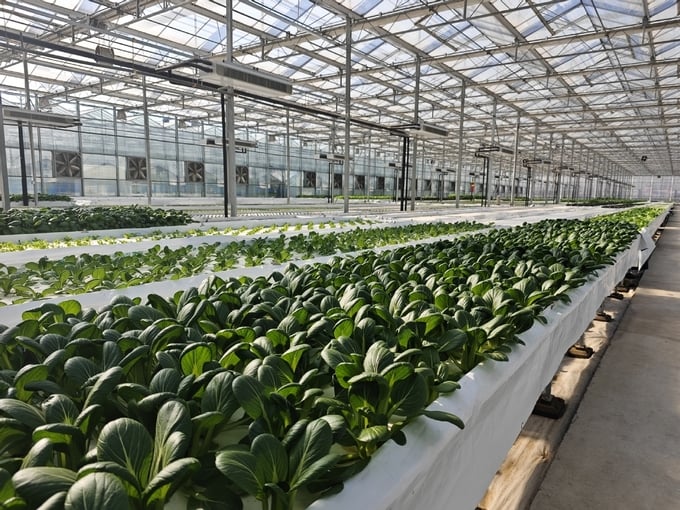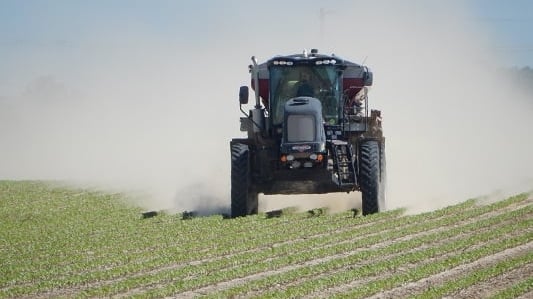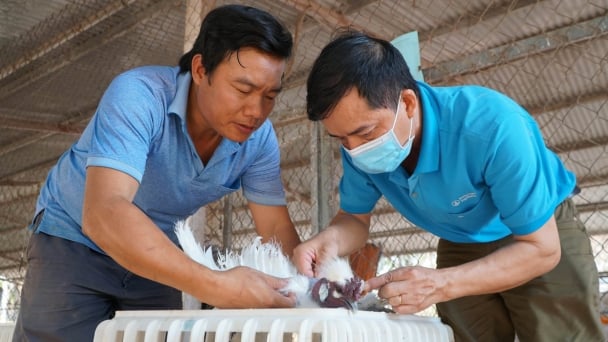May 16, 2025 | 09:46 GMT +7
May 16, 2025 | 09:46 GMT +7
Hotline: 0913.378.918
May 16, 2025 | 09:46 GMT +7
Hotline: 0913.378.918

This undated photo shows vegetables growing in greenhouses equipped with hydroponic technology in Shandong province. Photo: Xinhua.
The blueprint document is the first policy statement released by China's central authorities each year. And this year, the nation plans to leverage scientific innovation to inject impetus into the modernization of agriculture, amid China's rapid advancements in biotech and smart farming equipment.
Policy support
China's "No 1 central document" for 2025 outlines its priorities in deepening rural reforms, and takes solid steps to advance all-around rural vitalization.
The document emphasizes the importance of developing new quality productive forces in agriculture according to local conditions, and calls for the cultivation of leading high-tech agricultural enterprises and the acceleration of breakthroughs in seed varieties.
The country will support the development of smart agriculture and expand the application scenarios of artificial intelligence, big data and low-altitude technologies, according to the document.
Sunday's release is a top-level development framework for the cultivation of new quality productive forces in the field of agriculture, said Jin Wencheng, director of the Research Center for the Rural Economy, which is affiliated with the Ministry of Agriculture and Rural Affairs.
The document stresses the importance of improving the agricultural sci-tech innovation system, and of nurturing agri-tech talent and emerging enterprises, while accelerating the large-scale application of agricultural sci-tech achievements, Jin said.
To address barriers hindering the application of new technologies and product commercialization, the country will establish a modern institutional framework that aligns with the development needs of new quality productive forces in agriculture.
He noted that a regional approach to the transformation and modernization of traditional agriculture is needed, as it balances the adoption of new technologies with employment stability.
Seed revolution
Seed innovation is crucial to China's agricultural modernization, and the document emphasizes the importance of accelerating breakthroughs in seed varieties through the country's key agricultural research platforms, and of advancing the industrialization of biological breeding.
Technology has been boosting the seed industry, said Ru Zhengang, a professor at the Henan Institute of Science and Technology, citing the country's improvements in grain yields over the decades.
Official data show that the national average grain yield stood at 389.7 kilograms per mu (0.067 hectares) in 2023, an increase of 321.1 kilograms per mu compared to 1949.
"The quality and breeding speeds of crop varieties are important factors affecting grain yields," Ru said, stressing the importance of leveraging new varieties and technologies to boost total grain yield and ensure the country's food security.
Ru also noted that interactive collaboration among farmers, agricultural researchers and enterprises has facilitated synergistic development between supply and demand, enhancing agricultural productivity and efficacy.
Industrial upgrade
Beyond seeds, rural industries are reinventing themselves through storytelling and tech integration.
Zhejiang's Lizu village, for example, has transformed its local pears into a "sweet industry" by branding itself with intellectual-property terms like the name of its cultural mascot — Zu'er — and blending farm products with tourism and entertainment, according to Jin Jing, who is in charge of the village's business operations and often dubbed the CEO of Lizu.
To stimulate innovative rural industries, the village has established innovation spaces that combine entrepreneurial mentorship, incubation and e-commerce training to provide tailored policy support and funding resources for entrepreneurs who are willing to lay down roots in rural regions.
Locals have also jumped on the startup bandwagon, forming a multitude of wealth-creation industries. In 2024, the local per capita disposable income reached 66,000 yuan ($9,206).
And the changes in Lizu can be seen as a microcosm of rural vitalization in Zhejiang province. Rural industries across the province have attracted 80,000 young entrepreneurs, over half of whom were born after 1990.
To attract talent, Jin stressed the importance of building incubation platforms, and of introducing policy incentives and resources to boost entrepreneurship.
"The countryside needs young people, and young people need the countryside even more," Jin said, calling on more young people to contribute to rural vitalization.
Xinhua

(VAN) Vietnam's draft amendment to Decree No. 156 proposes a mechanism for medicinal herb farming under forest canopies, linking economic development to population retention and the sustainable protection and development of forests.

(VAN) In reality, many craft village models combined with tourism in Son La have proven effective, bringing significant economic benefits to rural communities.

(VAN) The international conference titled Carbon Market: International experiences and recommendations for Vietnam was successfully held recently in Ho Chi Minh City.

(VAN) According to the Project on rearranging provincial and communal administrative units, in 2025, the country will have 34 provinces/cities, 3,321 communes, wards, and special zones, and no district-level organization.

(VAN) The vice president of fertilizer with Stone X Group says the Trump administration’s tariffs are impacting fertilizer markets.

(VAN) Resolution 57 offers Vietnam a significant opportunity to narrow the global genetic technology disparity and convert its extensive genetic resources into commercial advantages.

(VAN) The Ministry of Agriculture and Environment will prioritize the implementation of five core and breakthrough solutions in science and technology, in addition to the seven groups of tasks identified in Decision No. 503.